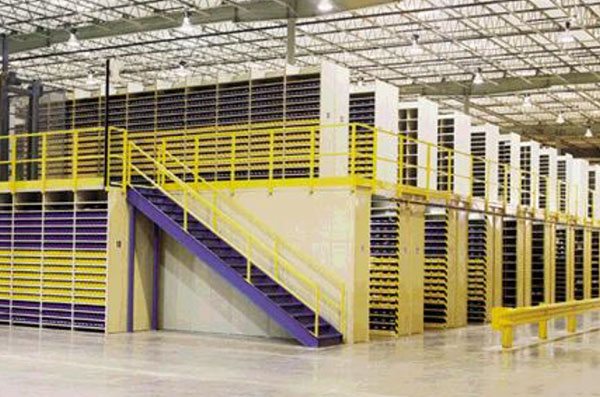Shelf supported mezzanines are ingenious space-saving solutions that have become increasingly popular across various industries.
These structures not only optimize storage space but also enhance organizational efficiency.
Let's start by understanding what shelf-supported mezzanines are and why they are revolutionizing the way businesses utilize their available space.
Defining Shelf-Supported Mezzanines
- Elevated Platforms: mezzanine shelving are elevated platforms or floors constructed above ground level and supported by a network of shelves or racks.
- Space Optimization: They are designed to maximize vertical space utilization, making them ideal for storage, production, or office expansion.
The Significance of Shelving Supported Mezzanine
- Space Efficiency: Shelf-supported mezzanines allow businesses to efficiently use vertical space, reducing the need for larger facilities.
- Cost Savings: They provide a cost-effective alternative to relocating or expanding existing spaces.
Shelf-supported mezzanines come in various types, each tailored to specific applications and space requirements.
Mezzanine Shelving
- Versatility: mezzanine shelving is consist of a network of shelves or racks supporting an elevated platform.
- Common Applications: They are versatile and commonly used for storage in warehouses and distribution centers.
Catwalk Mezzanines
- Narrow Aisles: Catwalk mezzanines feature narrower walkways, allowing access between rows of storage shelves.
- Order Picking: They are ideal for order picking and inventory management in retail and e-commerce settings.
Office Mezzanines
- Multi-Purpose: Office mezzanines serve as additional office space, providing a quiet and organized working environment.
- Commercial Spaces: They are popular in commercial settings, including corporate offices and call centers.
Industrial Mezzanines
- Heavy-Duty: Industrial mezzanines are designed to support heavy machinery, equipment, and materials.
- Manufacturing: They are commonly found in manufacturing facilities to accommodate production needs.
Designing shelf-supported mezzanines requires careful planning to ensure they are structurally sound, functional, and compliant with safety regulations.
Load-Bearing Capacity
- Structural Integrity: Determine the maximum weight the mezzanine must support, considering both static and dynamic loads.
- Racking Systems: Choose appropriate shelving or racking systems capable of supporting the intended loads.
Building Codes and Permits
- Compliance: Ensure that the design and construction adhere to local building codes and regulations.
- Permitting: Obtain the necessary permits for mezzanine construction, if required.
Safety Features
- Handrails and Guardrails: Install sturdy handrails and guardrails to prevent falls from elevated platforms.
- Non-Slip Surfaces: Use non-slip materials for flooring to enhance safety, especially in high-traffic areas.
Accessibility and Workflow
- Staircases and Lifts: Plan for safe and efficient access to the mezzanine, whether through staircases, lifts, or conveyors.
- Workflow Optimization: Consider how the mezzanine layout can improve workflow and material handling efficiency.
Shelf-supported mezzanines offer a multitude of advantages that make them a compelling choice for businesses looking to maximize their space.
Space Optimization
- Vertical Expansion: They effectively double the available floor space without the need for additional construction.
- Storage Efficiency: Ideal for organizing and storing a wide range of products and materials.
Cost-Effective Solutions
- Savings: mezzanine balustrade are a cost-effective alternative to building or relocating to larger facilities.
- Tax Benefits: Some jurisdictions offer tax incentives for utilizing vertical space efficiently.
Versatility
- Multi-Functional: They can serve various purposes, from storage to production, offices, or even retail displays.
- Adaptability: Easily reconfigure the mezzanine layout to accommodate changing business needs.
Shelf-supported mezzanines find applications in diverse industries due to their versatility and space-saving features.
Warehousing and Distribution
- Storage: Ideal for maximizing storage capacity in warehouses and distribution centers.
- Inventory Management: Facilitates efficient inventory management and order picking.
Manufacturing Facilities
- Production Expansion: Provides additional space for production lines and equipment.
- Assembly and Quality Control: Used for assembly, quality control, and staging areas.
Commercial Spaces
- Retail: Enhances retail spaces by creating additional showroom or storage space.
- Office Expansion: Serves as office space for administrative functions in commercial buildings.
Industrial Settings
- Heavy Machinery: Supports heavy machinery, manufacturing processes, and material storage.
- Workstations: Provides elevated workstations for tasks that require a higher vantage point.
Shelf-supported mezzanines are revolutionizing the way businesses optimize their available space. Whether you're seeking to expand storage capacity, increase production efficiency, or create additional office space, these versatile structures offer a cost-effective and space-saving solution. As businesses continue to evolve, the role of railing mezzanine in efficient space management will remain paramount, contributing to increased productivity and profitability.


